Related Research Articles
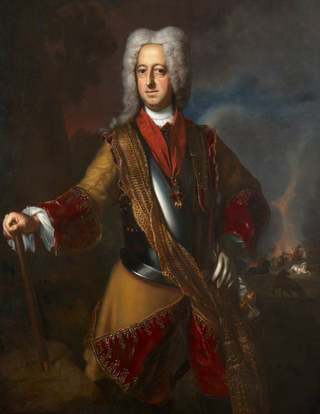
Maximilian II, also known as Max Emanuel or Maximilian Emanuel, was a Wittelsbach ruler of Bavaria and a Prince-elector of the Holy Roman Empire. He was also the last governor of the Spanish Netherlands and Duke of Luxembourg. An able soldier, his ambition led to conflicts that limited his ultimate dynastic achievements.

Werner Klemperer was an American actor. He was known for playing Colonel Wilhelm Klink on the CBS television sitcom Hogan's Heroes, for which he twice won the award for Outstanding Supporting Actor in a Comedy Series at the Primetime Emmy Awards in 1968 and 1969.
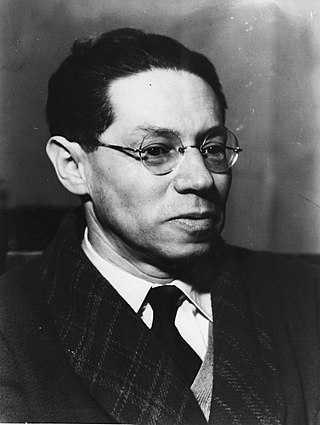
Lion Feuchtwanger was a German Jewish novelist and playwright. A prominent figure in the literary world of Weimar Germany, he influenced contemporaries including playwright Bertolt Brecht.
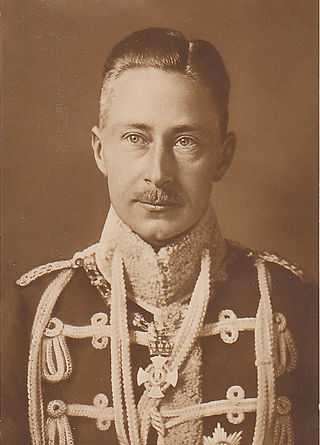
Wilhelm, German Crown Prince, Crown Prince of Prussia was the eldest child of the last Kaiser, the German Emperor, Wilhelm II, and his consort Augusta Victoria of Schleswig-Holstein. As Emperor Wilhelm's heir, he was the last Crown Prince of the German Empire and the Kingdom of Prussia.

Victor Klemperer was a German scholar who also became known as a diarist. His journals, published in Germany in 1995, detailed his life under the German Empire, the Weimar Republic, the Third Reich, and the German Democratic Republic. Those covering the period of the Third Reich have since become standard sources and have been extensively quoted by Saul Friedländer, Michael Burleigh, Richard J. Evans, and Max Hastings.

Alfred Kerr was an influential German theatre critic and essayist of Jewish descent, nicknamed the Kulturpapst.

Heinrich Wilhelm "Heinz" Rühmann was a German film actor who appeared in over 100 films between 1926 and 1993. He is one of the most famous and popular German actors of the 20th century, and is considered a German film legend. Rühmann is best known for playing the part of a comic ordinary citizen in film comedies such as Three from the Filling Station and The Punch Bowl. During his later years, he was also a respected character actor in films such as The Captain from Köpenick and It Happened in Broad Daylight. His only English-speaking movie was Ship of Fools in 1964.
Klaus Pringsheim Sr. was a German-born composer, conductor, music-educator and the twin brother of Katharina "Katia" Pringsheim, who married Thomas Mann in 1905.
André Andrejew was one of the most important art directors of the international cinema of the twentieth century. He had a distinctive, innovative style. His décors were both expressive and realistic. French writer Lucie Derain described Andrejew at the peak of his career as "an artist of the grand style, blessed with a vision of lyrical quality." Edith C. Lee wrote recently: "Believing in creative freedom rather than academic reconstruction, André Andrejew fulfilled the 20th century's notion of the romantic, individualistic artist. The unusual titillated his imagination."
Minna von Barnhelm or the Soldiers' Happiness is a lustspiel or comedy by the German author Gotthold Ephraim Lessing. It has five acts, was begun in 1763 and completed in 1767 – its author put the year 1763 on the official title page, presumably to emphasize that the recent Seven Years' War plays a major part in the play, which is set on 22 August 1763. It is one of the most important comedies in German literature. It was first performed in 1767 by the Hamburg National Theatre, where Lessing worked as a dramaturg.
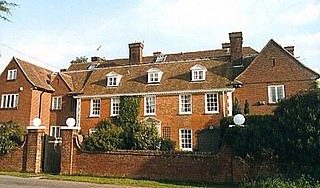
The Bunce Court School was an independent, private boarding school in the village of Otterden, in Kent, England. It was founded in 1933 by Anna Essinger, who had previously founded a boarding school, Landschulheim Herrlingen in the south of Germany, but after the Nazi Party seized power in 1933, she began to see that the school had no future in Germany. She quietly found a new home for the school and received permission from the parents of her pupils, most of whom were Jewish, to bring them to safety in England. The new school was called New Herrlingen School, but came to be known as Bunce Court. The school closed in 1948. Alumni, who sometimes stayed on at the school even after finishing, were devoted to the school and organized reunions for 55 years. They have referred to its "immense effect" on their lives, as "Shangri-La" and to being there as "walking on holy ground".
Hanna Bergas was a German teacher. Fired from her job and prevented from teaching in public schools in Nazi Germany, she found employment at a private boarding school in Blaustein, in southern Germany. In 1939, after she had fled to England, Bergas was part of the group of teachers from Bunce Court School that met the Kindertransports and helped the refugee children adjust to their lives in the new country. After the war, Bergas emigrated a second time, moving to the United States.
Michael Roemer is a film director, producer and writer. He has won several awards for his films. He is the recipient of a Guggenheim Fellowship. A professor at Yale University, he is the author of Telling Stories.
Bruno Maria Adler was a German art historian and writer. He taught art history in Weimar and lectured about it at the Bauhaus. Adler fled Germany after the Nazis seized power and emigrated to England, where he worked first at a German-Jewish refugee school in Kent, then as a writer with the German Service of BBC Radio.
Klemens Wilhelm von Klemperer was a historian of modern Europe and professor at Smith College, Northampton, Massachusetts. He was a prominent member of the generation of young refugees and emigrants who fled Nazi Germany in the 1930s and established themselves as historians and often leading scholars in the United States. His teaching and writings focused on 20th century Germany and Central Europe, in particular the Nazi regime and the resistance to Hitler. In 1997, he was awarded the Austrian Cross of Honour for Science and Art, 1st class for his contribution and services to Austrian culture. He delivered a lecture in June 1998 at Westminster Abbey to mark the unveiling of a sculpture of Dietrich Bonhoeffer in the "Martyrs' Gallery".
Dr. Willy Cohn was a German historian and teacher. During the Nazi era, he documented the Jewish life in Breslau in his diaries, until he and his family were deported to German-occupied Lithuania and killed.

Willy Marckwald was a German chemist. </ref>
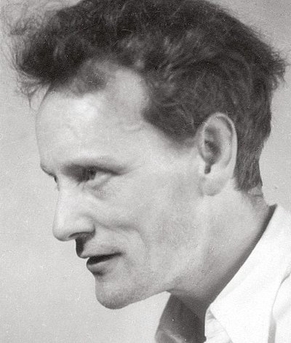
Wilhelm "Willy" Schürmann-Horster was a German actor, dramaturge, and director who was marxist and dedicated communist, and who became a resistance fighter against the Nazis. As a young man, Schürmann-Horster trained as an actor at the Düsseldorf Drama School. During the 1920s he worked in various acting troupes in theatres in the Rhineland. By the mid 1930s, he had become a communist and in 1934 and 1935 he was arrested for political agitation but acquitted for lack of evidence. After moving to Berlin in 1937, he met and became friends with Cay and Erika von Brockdorff. Through them, a discussion group of like-minded friends was formed who openly discussed current affairs and Schürmann-Horster became their spokesman. Through contacts in the group, connections were made with a resistance organisations that was run by Harro Schulze-Boysen and Arvid Harnack in 1940. Although Schürmann-Horster wasn't a physical resistance fighter in the cast of Harro Schulze-Boysen, he was an intellectual opponent of the Nazis who displayed his convictions on the stage and as a result never took part in any of the operations that his friends undertook. After falling ill in 1941, Schürmann-Horster moved to Konstanz where he worked as a dramaturge at the Grenzland Theatre. In October 1942, he was arrested and sentenced to death for "high treason", "dissemination of illegal writings" and "aiding and abetting the enemy" by the 2nd of the Volksgerichtshof. He was executed in Plötzensee Prison on 9 September 1943. He was described by his close friend, the communist trade unionist Rudy Goguel in the daily newspaper Südkurier as
Friederike Bertha Helene Weylnée Joseph was a German writer and translator. She was married to the mathematician Hermann Weyl.
References
- 1 2 3 4 5 6 7 8 9 Michael Trede, Der Rückkehrer ecomed verlagsgesellschaft AG & Co. KG, Landsberg, Germany (2003), pp. 104-106 ISBN 3-609-16172-8 Retrieved October 5, 2011 (in German)
- 1 2 Affidavit from Wilhelm Marckwald (PDF) Paul Walter Jacob Archive, University of Hamburg, Walter-A.-Berendsohn-Forschungsstelle für deutsche Exilliteratur. (May 30, 1962). Retrieved October 31, 2011 (in German)
- ↑ Harold Jackson, "Anna's children" The Guardian (July 18, 2003). Retrieved September 29, 2011
- ↑ José María Caparrós Lera, Arte y política en el cine de la República (1931-1939) Edic. Universidad (1981), p. 114. ISBN 84-85411-48-X (in Spanish)
- 1 2 3 4 Hanna Bergas, Fifteen Years: Lived among, with and for refugee children, 1933-1948 (PDF) Unpublished. (1979), pp. 59, 62 Palo Alto, California. Manuscript archived at the Leo Baeck Institute / Center for Jewish History, New York.
- ↑ Michael Roemer, Telling Stories: Postmodernism and the Invalidation of Traditional Narrative University Press of America, Inc. (1997), p. xi. ISBN 1-57309-035-2 Retrieved October 31, 2011
- ↑ Victor Klemperer, "Tagebuchnotizen Victor Klemperers zum Transport 'V/5'" Universitiet van Amsterdam, DDR-Justiz und NS-Verbrechen. Retrieved October 30, 2011 (in German)
- ↑ Michael Trede, Der Rückkehrer (2003), pp. 87-89